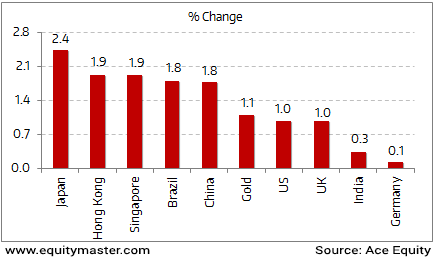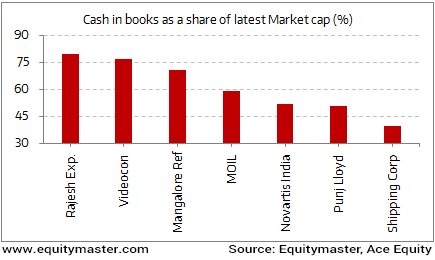Low Hanging Fruit? The Story of Infosys and Cash-Rich Underperformers
- In this issue
- » Is cash in books a comforting factor?
- » The final nail in the coffin for PSU banks
- » The week's market update
- » and more...

You can call it anchoring bias.
Founders of successful companies expect the new managers to follow the same rules they did. They anchor the company's ethics and values to the ground rules they laid. They empower the new management to take growth decisions and use cash...but expect little divergence from the past.
Investors too anchor their perception of management quality to past performance. They rate best the companies with a track record of prudent spending and high shareholder return. But when the new management tries to break from the past, both founders and minority shareholders struggle to come to terms with the change.
Here's Infosys' Narayana Murthy in an interview in 2012...
- Given that I took 10 per cent of what I was earning before starting Infosys and that salary was very low even by the standards of 1981, I did not expect that the CEO salaries would reach what they are today.
We, the founders at Infosys, decided right from the beginning that we would set an example for the entire Indian industry in the compensation of the founders. We decided that no founder would use any corporate resources for any personal benefits. We decided that our salaries would be lower than the senior management staff who did not own stocks like we did. Even today, the salaries of Kris and Shibu are less than 40 per cent of the salary of the people that report to them. No Infoscion has any company car. We also eschewed any granting of options to the founders.
Steep management salaries never found favour with the founders of Infosys. And Infosys is not alone. Every time we met the managements of companies like Infosys, Hawkins, or Ambika Cotton, their preference for frugality is evident. It's a hallmark of their businesses. Too precious to let go because of the ambitions of any newcomer.
Investors' trust in these 'changed' companies is hard to come by. They notice a shift in the spending decisions and use of surplus cash. They fear losing money in the stocks that were once their biggest wealth creators. And so they rate the management quality lower.
The companies may continue to grow under the new management. They may continue to have a lean balance sheet with surplus cash. But the new managements cannot escape the skepticism over their ability to stay grounded. Or act in the interest of all stakeholders. And that's when valuations take a beating.
The tussle between the founders of Infosys and its board of directors has long been in the making. We won't pass judgement on who went wrong. But the minority shareholders certainly need to re-anchor their expectations.
Investors typically see cash-rich companies with lean balance sheets as low hanging fruit. When the stocks of such companies underperform, value investors begin to salivate. No doubt the market's skepticism could be an opportunity to easily grab a ripe bargain.
What could go wrong with the cash-rich bargains?
| Cash to Marketcap (%) | Return on Equity (%) | Debt / Equity (x) | Change in stock price (%, 1 yr) | |
|---|---|---|---|---|
| Infosys | 13.4 | 25.2 | 0.0 | -14.4 |
| Kitex Garments | 12.2 | 30.7 | 0.3 | -3.9 |
| Pfizer | 12.7 | 38.7 | 0.0 | -18.5 |
| Wipro | 10.6 | 22.1 | 0.3 | -12.6 |
But do not jump to conclusions based on a juicy track record. Callous growth tactics and misuse of cash destroy shareholder value.
You have to do your homework before grabbing low-hanging cash-rich underperformers.
The Equitymaster Risk Matrix (ERMTM) helps us keep our analysis objective and cast aside all anchoring biases. We're certain our StockSelect subscribers would vouch for it.
02:40 Chart of the Day
Readers know that we are not big fans of companies keen to hold tons of cash in their balance sheet for no tangible reason. Yes, we have been skeptics of excessive surplus cash well before the Satyam blowup. But companies that regularly use the cash to invest prudently or pay dividends score well with us.
That said, not every company that has a high proportion of cash as a share of market cap is a value buy according to us.
Cash Buffer May Not Make the Stock a Value Buy
The recent BSE IPO brought us face to face with this dilemma. The offer was priced at Rs 806 per share. On earnings alone, it was valued at a steep 36x its latest annualised earnings.
There was a twist in the tale though. Big enough to give it an entirely different ending.
The company had a massive Rs 38.6 billion in cash and investments on its balance sheet. On a per share basis, that's Rs 708 per share, almost 90% of the offer price.
We still gave the IPO a pass. There was no clarity on what the company would do with this huge cash hoard. It could well remain on the balance sheet, losing its value with each passing year.
Investors will value the Rs 38.6 billion differently depending on when they expect this hoard to be realised.
We, wanting to be conservative, assumed it would never be realised. In our analysis, we only considered BSE's other income arising out of these holdings and left the cash holdings out of the equation entirely.
The danger of giving bloated valuations just because a stock has cash or valuable real estate on its balance sheet is not lost on us.
This trend reaches a frenzy in a bull market as analysts try every trick in the book to justify exorbitant valuations.
Here's a troubling bit of news. The government's revival plan for Air India is not working.
The reason? Rising crude oil prices. It appears the airline in its current avatar can't be saved. This is despite the fact that the last two years have been very good for the civil aviation sector. Air India reported a loss of Rs 35 billion in FY16.
The government has now decided to change course. No, there's no talk of privatisation. But they are reportedly evaluating a proposal to induct banks as strategic investors!
How would this happen?
A consortium of 19 banks, led by State Bank of India, would convert Air India's working capital debt of Rs 280 billion into equity. This would convert about 56% of Air India's total debt (over Rs 500 billion), into equity. Subsequently, the airline could be listed on the stock market.
This a bad idea in our view.
PSU banks are awash with NPAs. There seems to be no end in sight. This could be the final nail in their coffin.
Will PSU banks be prepared to take this gamble? What if Air India does not turn around? Will they have to write of their investment?
These are precisely the kind of risks that could wipe out investors in PSU bank stocks we believe.
Global markets ended the week on a positive note. Major Asian indices like Japan (up 2.4%) and Hong Kong (up 1.9%) were the top gainers for the week. While European markets closed on a flattish note. A host of strong economic data across various countries and hopes that US President Donald Trump would take measures that will boost US economic growth helped to support global indices.
US Markets (up 1%) continue to see new highs, as President Donald Trump said he would make a major tax announcement in a few weeks. Trump is looking forward to lower the tax burden on corporates. The US markets have rallied by almost 8% since Trump's victory in the elections. The US indices have surged, as he promises not only to lower corporate taxes, but also reduce regulations and increase infrastructure spending. This has elated most investors.
The investors are now looking for details about Trump's policy agenda; this will too impact the market direction going forward. The rally in the US market was also boosted on the back of recent economic data and reports that indicate the US economy might be on the upswing early in the year.
As Trump promises for better corporate tax structure, various Asian markets too surged during the week gone by. Major European stocks closed the week on a flattish note, but have closed at two week high levels. A raft of better than expected UK data too boosted the rally in the British indices.
Back home, the Indian indices closed higher by 0.3% for the week. Contrary to strong expectations, the Reserve Bank of India, maintained status quo in interest rates once again. The markets had still pinned hopes on repo rate cuts to kick start the economic growth engine amidst a benign inflationary environment.
Performance During the Week Ended 11th February, 2017

04:50 Weekend Investing Mantra
What counts for most people in investing is not how much they know, but rather how realistically they define what they don't know. - Warren Buffett
This edition of The 5 Minute WrapUp is authored by Tanushree Banerjee (Research Analyst).Today's Premium Edition.
Today being a Saturday, there is no Premium edition being published. But you can always read our most recent issue here...
Recent Articles
- All Good Things Come to an End... April 8, 2020
- Why your favourite e-letter won't reach you every week day.
- A Safe Stock to Lockdown Now April 2, 2020
- The market crashc has made strong, established brands attractive. Here's a stock to make the most of this opportunity...
- Sorry Warren Buffett, I'm Following This Man Instead of You in 2020 March 30, 2020
- This man warned of an impending market correction while everyone else was celebrating the renewed optimism in early 2020...
- China Had Its Brawn. It's Time for India's Brain March 23, 2020
- The post coronavirus economic boom won't be led by China.



Equitymaster requests your view! Post a comment on "Low Hanging Fruit? The Story of Infosys and Cash-Rich Underperformers". Click here!
Comments are moderated by Equitymaster, in accordance with the Terms of Use, and may not appear
on this article until they have been reviewed and deemed appropriate for posting.
In the meantime, you may want to share this article with your friends!